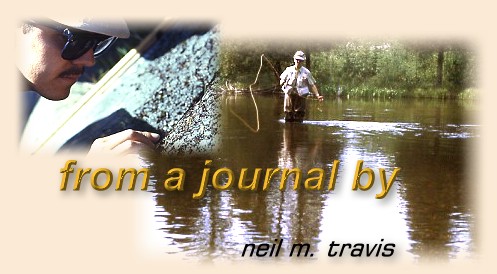FINDING THE WHY INSIDE THE HOW
I have always been more interested in the why rather than the how. Socrates is credited with stating: "The unexamined life is not worth living." While I'm not certain that I fully agree with Socrates conclusion that life without careful examination is not worth living, I am of the conviction that knowing the why is of inestimable importance.
What, you might well ask, does this have to do with fly fishing?
Fly fishing, over its history, has never been the method of choice for the majority of anglers. Fly fishers are just one rather small part of a much larger group of individuals that fish for sport, for recreation. Traditional fly fishing, even at the most elementary level, requires a certain degree of skill if the practitioner has much hope of enjoyment or success. If you have ever watched a frustrated beginner trying to make a successful cast you have little doubt of the truth of that statement.
Today there is a "new kid" on the block, Tenkara. Tenkara is not really new; it is a method of fishing for native trout in Japan in the small mountain streams that are found in that country. The method, although not called Tenkara, was first mentioned in a diary kept by Mr. Ernest Satow, a British diplomat to Japan. In 1877 and 1878 he recorded in his diary the first known references to Tenkara style fishing. From the stand point of many older anglers catching fish using a method that resembles Tenkara fishing is something that most of us practiced when we were kids, except it did not involve a fly but a bobber and a worm. The attraction seems to be the simplicity, which brings us back to the question of the why of fishing rather than the how.
I will venture a theory that fly fishing that involves casting more than just a piece of line that is only slightly longer than the rod and requires the refining of certain skills to attain competency with that equipment is precisely the attraction. While it is not my intention to demean Tenkara-style fishing, the fact remains that it is the simplest method or way of fishing with a fly. In the current generation that delights in instant gratification Tenkara-style fly fishing unquestionably has a great attraction. If the "why" is simply to make it as simple and easy as possible and still produce results, i.e. fish in hand, then this style of fishing will have ultimate appeal. That is the reason that it's important that we understand the "why."
I have a respectable collection of angling literature, mostly concerning fly fishing. The largest number of the volumes in my collection deals with the "how" of fly fishing. How to tie flies, to cast, tie knots, proper presentation, etc.; and only a very few ever touch on the reasons why the author chose this method of angling. Like the elements of a criminal act, the motive, the why, is far more important than the how. The why gives us the motive and reveals the desired result while the how merely gives us the method.
If, in modern fly fishing, the how is merely to make it as simple and easy as possible then I fear for the future of the sport. Increasingly we find ourselves living in a world where the application of diligence as a means of success is finding less and less favor with many in our society. In the process I fear that we are in danger of losing that most important of values; the motive or even the ability to even articulate one.
